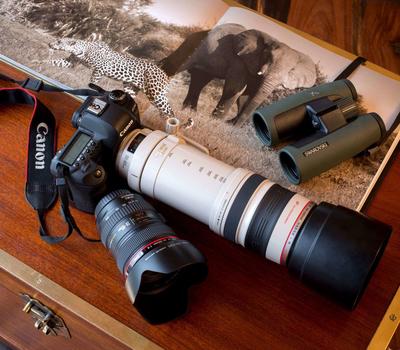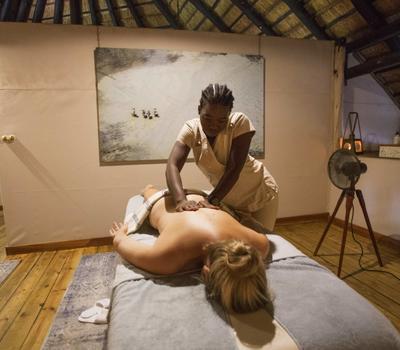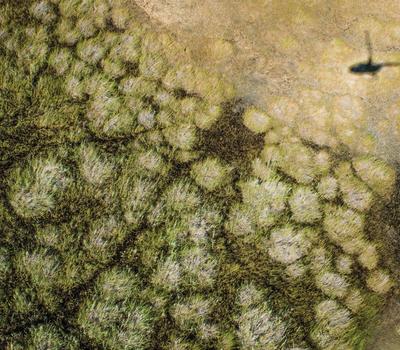Selinda Camp
Safari Drives (day & night)
(INCLUDED)
Guided Walks
(INCLUDED)
Motorised Boating
(INCLUDED)
Catch-and-Release Fishing
(INCLUDED)
Young Explorers Program
(INCLUDED)

Photography

Spa
(EXTRA)

Scenic Flight and Champagne Stop
(OPTIONAL)
Sustainability & Conservation Initiatives
Rhino's Without Borders
• Great Plains Conservation and andBeyond joint initiative Rhinos Without Borders is dedicated to ensuring the survival of Southern Africa’s rhinos by translocating a breeding population of 100 animals to a Botswana safe haven. By December 2019, 87 rhinos had been relocated.
• Rhinos Without Borders has provided jobs and training for multiple teams of field monitors, fully equipped with vehicles and aerial survey capabilities.
Solar Lantern Project
• Our Solar Lantern project provides community members with a safe and sustainable light source. Providing a basic need to communities living on the edges of the Okavango Delta: safe and sustainable light.
Kids Conservation Camps
• Through the Great Plains Student Conservation Camps one of our longest running programs, we are fighting lack of knowledge with proactive conservation education by reaching teachers and students both in their communities and in Great Plains camps with environmental and conservation education. Since the program began more than ten years ago hundreds of children have benefitted from the program in both Kenya and Botswana.
• Great Plains has partnered with conservation groups and artists to produce conservation-focused comic books. This collaboration transcends traditional educational materials, engaging children of a wide age spectrum and literacy abilities in conservation messaging.
• Conservation education provides a way to engage youth with the natural world at a pivotal time in their lives. The Great Plains Foundation believes that through thoughtful engagement, environmental education, fun and mentorship, youth in communities that border protected land can learn to appreciate the uniqueness of their ecosystems and become champions for the land and animals they live among.
The Great Plains Academy
• Great Plains Academy provides personal and community enrichment opportunities for individuals in northern Botswana. The Great Plains Academy’s role is to tackle the lack of accessible, quality education by starting in one region and expanding into other areas in Africa.
Solar Mamas
Great Plains Academy’s Solar Mama Program in collaboration with The Barefoot College in India took 9 women from the community to be the first participants in the Great Plains Academy’s Solar Mama Program. These nine women embarked on a five-month course in Inda to learn solar power technology and basic business skills. When they return, they will be solar engineers, businesswomen and trainers who will work within their communities to expand access to solar power.
The Solar Mamas Initiative
- teaches women a new skill that creates income and empowers them within their communities.
- Encourages environmental stewardship.
– Supports the spread of rural electrification via renewable energy.
Mobile Cinema Project
With several of their films already translated into local languages, the goal is now to run roving screenings in partnership with local education and conservation organizations. By increasing the knowledge of those who live within these fragile ecosystems, we are eroding the pillar we call Greed and instilling a wonder and respect for the environment.
Tress For Africa
Through the Conservation Grow project, Great Plains Foundation aims to restore indigenous trees to landscapes across Kenya, Botswana, and Zimbabwe. Working with local communities and schools. The project teaches the value of indigenous trees and their critical role in functioning ecosystems.
To date we have planted trees in partnership with schools in Botswana and Zimbabwe as part of our conservation education outreach work and on a deforested section of land bordering the Maasai Mara.
Land For Lions Project
We have partnered with local communities and other conservation stakeholders to run The Land for Lions project. This project aims to provide sufficient protection and habitat for wild lion populations to survive. Current Land for Lions projects operates in Zimbabwe, Kenya, and Botswana, utilizing innovative approaches to generate maximum positive impact for lion conservation outcomes. It includes projects such as restoring the Sapi Reserve in Zimbabwe and raising funds for emergency purchases of critical corridors of land.
Project Ranger
Project Ranger fills a critical gap in supporting the wildlife monitoring, surveying, and anti-poaching operations of existing NGO’s in Africa. It is an emergency fund supporting those on the front lines of conservation, supplementing the budget deficits of local ground partners by funding salaries and providing operational support for wildlife monitors, rangers and anti-poaching personnel. Contributions from private individuals, foundations, and corporate partners keep rangers employed and ensure they have the resources they need to do their best work.
Traditional Herding Workshops
Humans and wildlife have coexisted for millennia in Botswana’s Okavango Delta region. Over the generations, unique cultural adaptations were developed to address the competing interests of wild animal populations and domesticated livestock.
Unfortunately, recent cultural shifts in values have meant that the lessons and wisdom from previous generations are being abandoned, resulting in poor land management and human-wildlife conflict. Through Traditional Herding Workshops, we re-introduce local farmers to the wisdom of their forbearers and encourage them to apply these lessons to their current practices.\
Life With Elephants
Through a relationship with villagers who are members of Ecoexist in Eretsha, the Great Plains Foundation is able to bring guests to their Life with Elephants tour. The tour has benefited the community both financially and through a meaningful cultural exchange.









